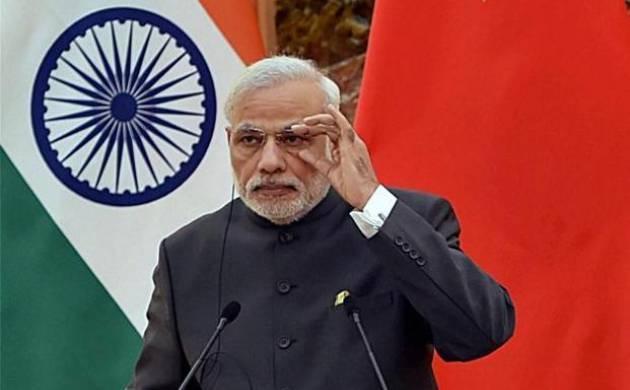By APD writer Rishika Chauhan
COLOMBO, June 11 (APD) - India and Sri Lanka agreed that terrorism is a threat that calls for collective action by the global community, Prime Minister Narendra Modi said after meeting President Maithripala Sirisena on Sunday, capping his four-hour visit, the first by a world leader to the terror-ravaged island nation since the Easter Sunday bombings of April 21.
Modi meets counterpart, Prez, Oppn leader, calls for joint action
Modi arrived from Maldives as part of his first foreign trip after re-election as the Prime Minister, a visit that underlined the Indian government’s “neighbourhood first” policy. Modi also held talks with PM Ranil Wickremesinghe and Opposition leader Mahinda Rajapaksa in Sri Lanka, which is key to India’s strategic interests, especially in view of China’s push to expand its influence in the Indian Ocean region.
Before commencing official talks, Modi visited St Anthony’s Church in Colombo, one of three churches targeted by the Easter Sunday suicide bombers.
The bombings on three churches and three luxury hotels left 258 people dead, dealing a blow to Sri Lanka’s vital tourism industry. The Islamic State group claimed responsibility for the attacks, carried out by a local radicalised Muslim group known as National ThowheedJammath. It has been widely reported that Colombo failed to act on intelligence warnings provided by India.
“I am confident Sri Lanka will rise again. Cowardly acts of terror cannot defeat the spirit of Sri Lanka. India stands in solidarity with the people of Sri Lanka,” Modi tweeted after visiting the church.
The timing of Modi’s visit was not lost on the Sri Lankan media, which welcomed the Indian leader with warm headlines. The Sunday Times saw “deep political significance” in Modi’s visit, while the Sunday Observer pointed to “New Delhi’s increasing sensitivity towards life south of the Palk Straits”.
After paying tributes to the victims, Modi arrived at the President’s House where he was accorded a ceremonial reception. Sirisena held an umbrella to provide cover for himself and Modi from rain.
External affairs ministry spokesperson Raveesh Kumar said the two leaders discussed issues of mutual interest.
“President Sirisena and I agreed that terrorism is a joint threat that needs collective and focussed action. Reiterated India’s commitment to partner with Sri Lanka for a shared,See page 8
secure and prosperous future,” Modi tweeted after the talks.
The Indian leader planted the sapling of an Ashoka tree at the President’s House and received a replica of the Samadhi Buddha Statue from Sirisena.
“A special gift from a special friend. President @MaithripalaS presented PM @narendramodi the Samadhi Buddha Statue. This is considered to be one of the best sculptures in the Anuradhapura era. The original statue was sculptured between the 4th and 7th centuries AD,” the Prime Minister’s Office tweeted.
Modi also held “fruitful discussions” with his Lankan counterpart Ranil Wickremesinghe and assured him of India’s full support to “further strengthen bilateral development partnership including through people oriented projects in Sri Lanka”. He held another meeting with the Leader of Opposition Rajapaksa, discussing the need for close collaboration between the two countries in the fields of counterterrorism, security and economic development.
A Tamil National Alliance delegation led by R Sampanthan, too, called on Modi and congratulated him on his landslide victory in the summer’s national elections. Modi also addressed the Indian community in Lanka and said India’s image had transformed in the last five years.
Modi termed his visit to Colombo “immensely fruitful”. “Sri Lanka has a special place in our hearts. I assure my sisters and brothers of Sri Lanka that India will always be there with you and support your nation’s progress. Thank you for the memorable welcome and hospitality,” he said before leaving the island nation.
India has been concerned about China’s influence in Sri Lanka and the neighbouring Maldives even as Beijing seeks more influence in the Indian Ocean region, which New Delhi considers a strategic backyard.
Modi, who visited Sri Lanka twice earlier — in March 2015 and May 2017, arrived there from the Maldives, where the archipelago nation’s new president, Ibrahim Mohamed Solih, pledged closer ties with New Delhi in a departure from his predecessor’s pro-Beijing policy.
Sri Lanka’s government has been trying to balance both Asian giants. Under the Modi government, India has handed over the first lot of houses built under a $350 million project, mostly for Tamils who live in Sri Lanka’s tea plantation areas.
Sri Lanka will elect a new President at the end of the year. Either minister Sajith Premadasa, the minister-in-attendance who accompanied Modi during his visit to the Sri Lankan capital; Speaker KaruJayasurya, who met Modi on Sunday; or PM Wickremesinghe – all of the United National Party (UNP) will be the presidential candidate or support each other. Though a constitutional amendment debars former president Rajapaksa from contesting again, he is said to be eyeing the seat for either his brother or his son. President Sirisena, has said he will not run himself but support any “suitable” UNP candidate (other than his bête noire — the PM). But a senior minister who did not want to be named told HT “anyone can support anyone and go back on withdrawal from elections” in Sri Lanka politics.
A South Block official familiar with developments said, “The PM is well aware of these dynamics and has sensibly adopted a multi-partisan approach to engaging Sri Lanka. “Realpolitik is the only way forward in engaging Sri Lanka,” said the official who did not want to be named.
(ASIA PACIFIC DAILY)

